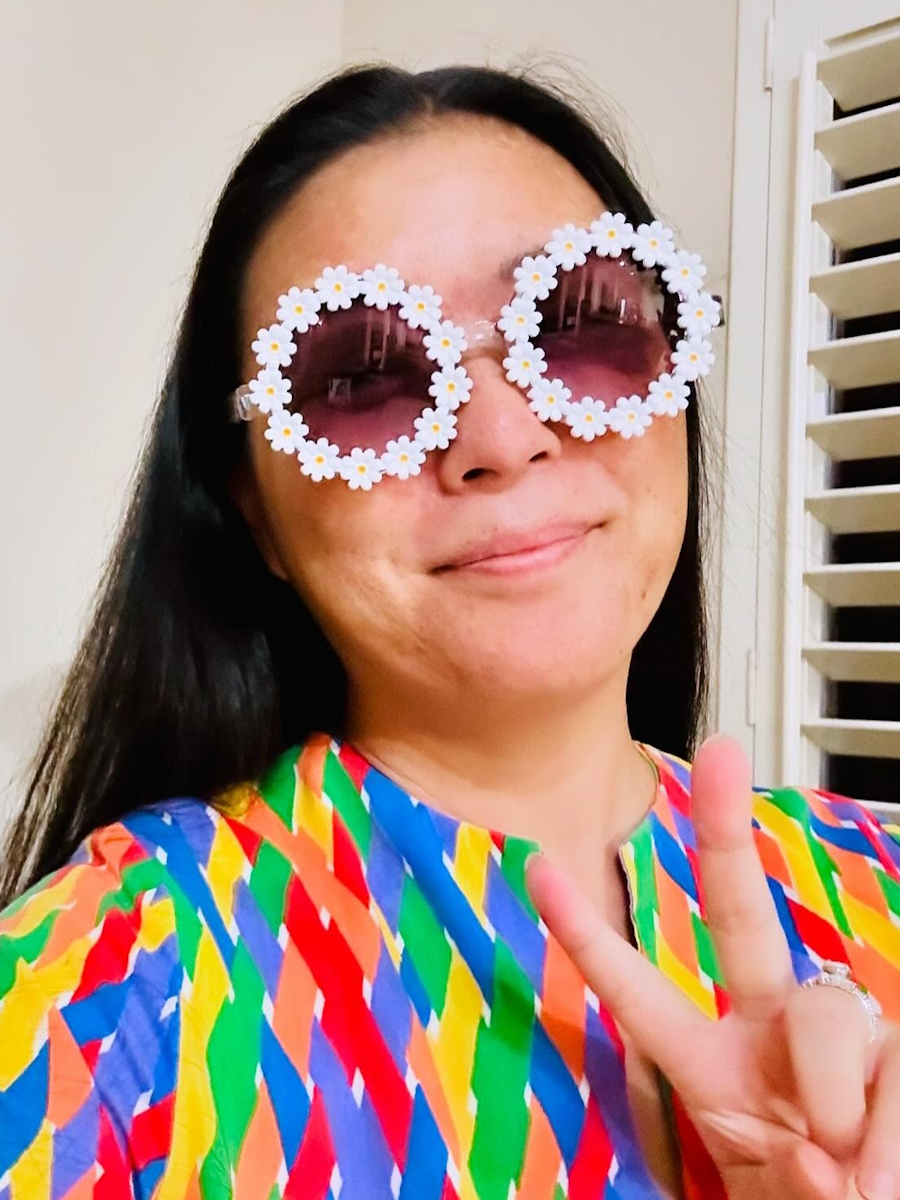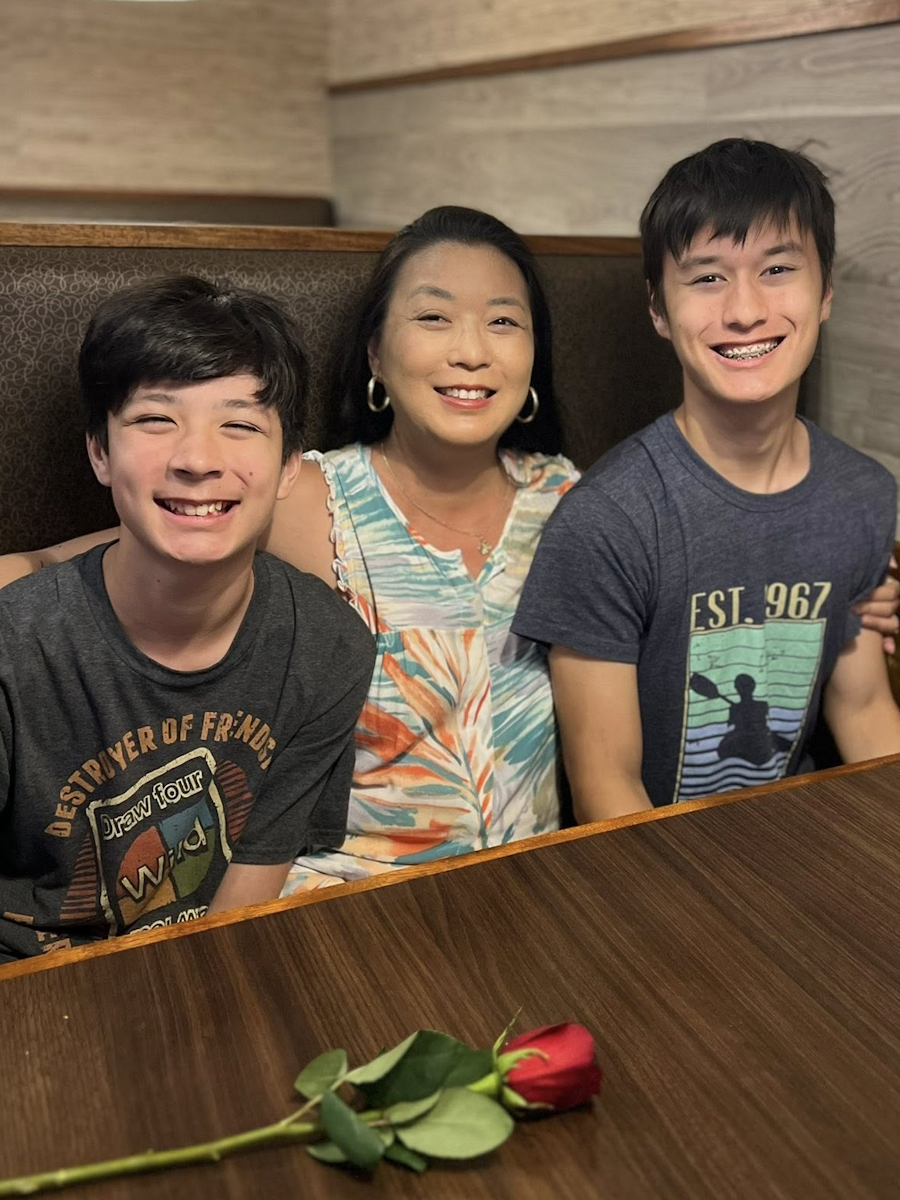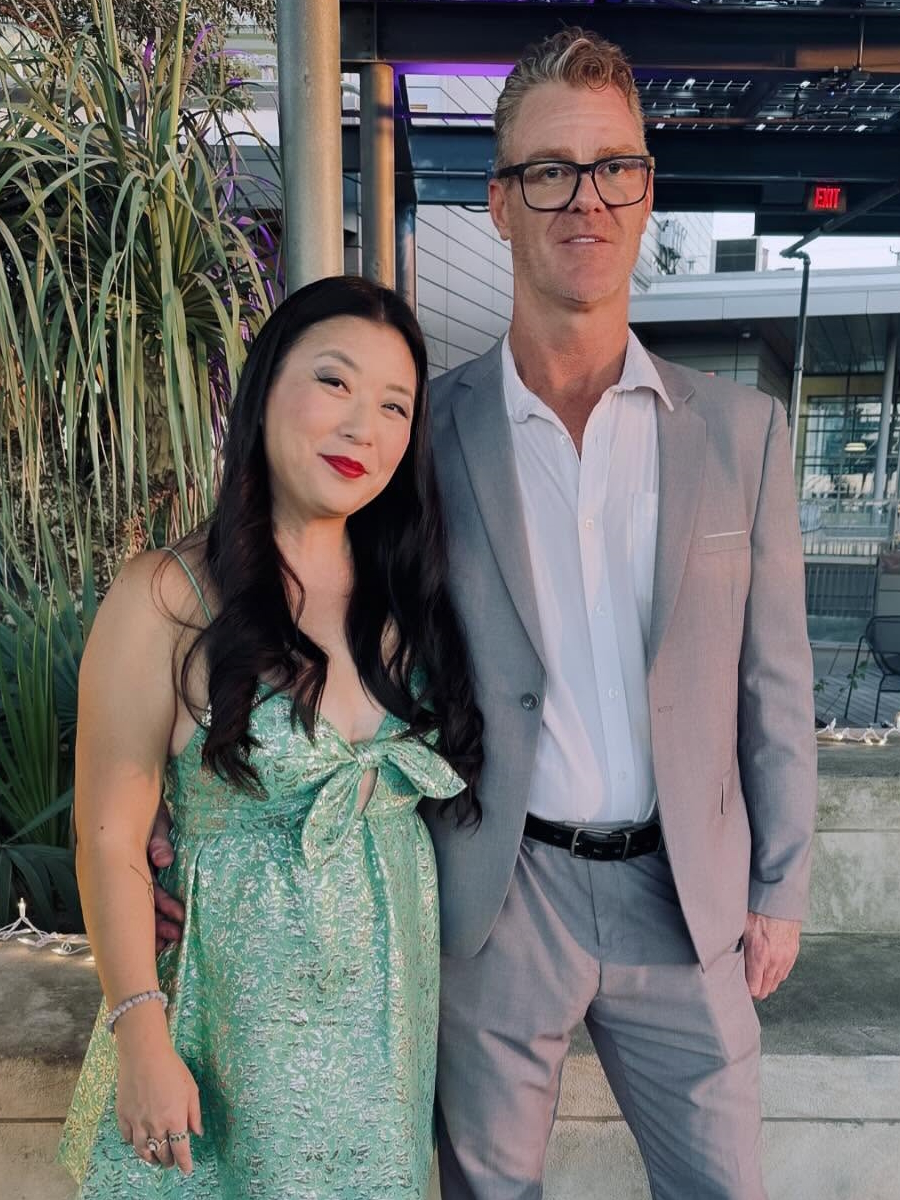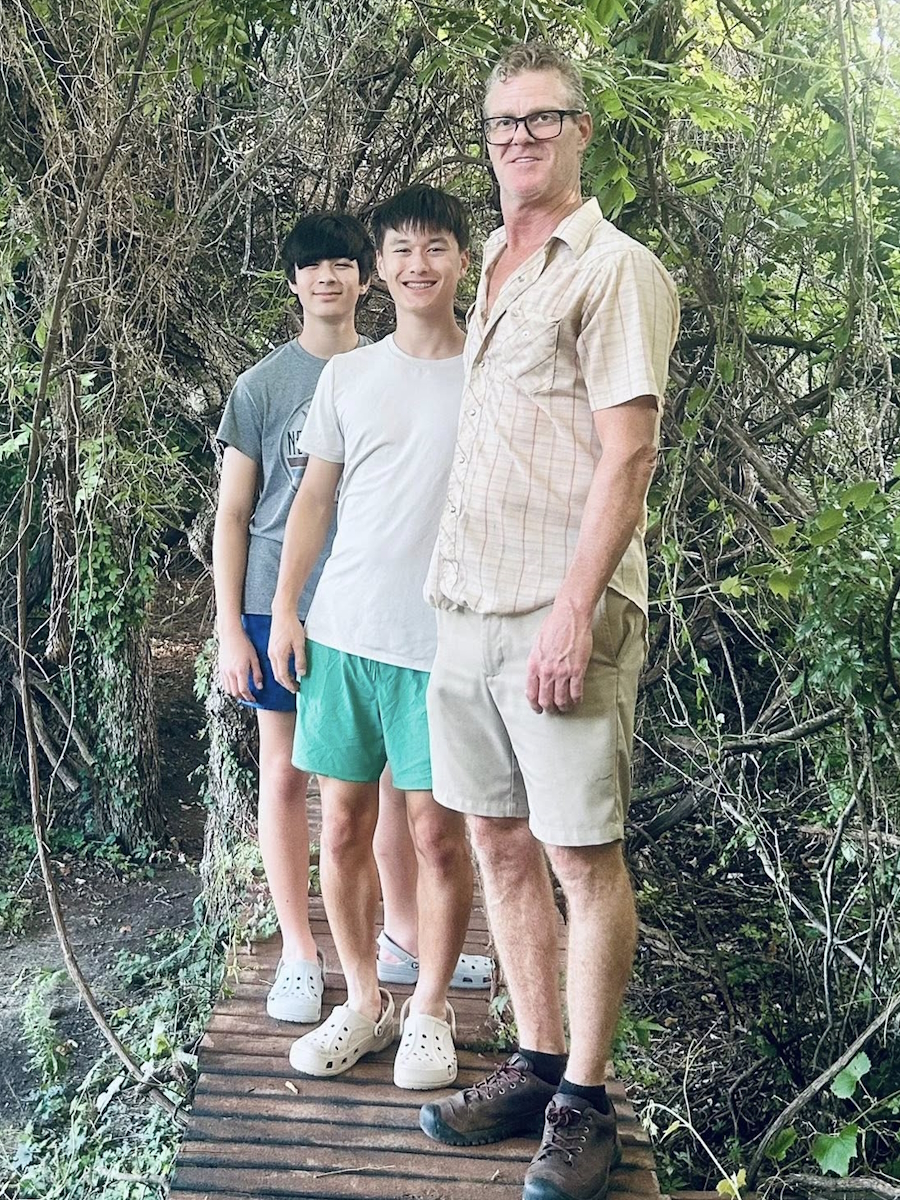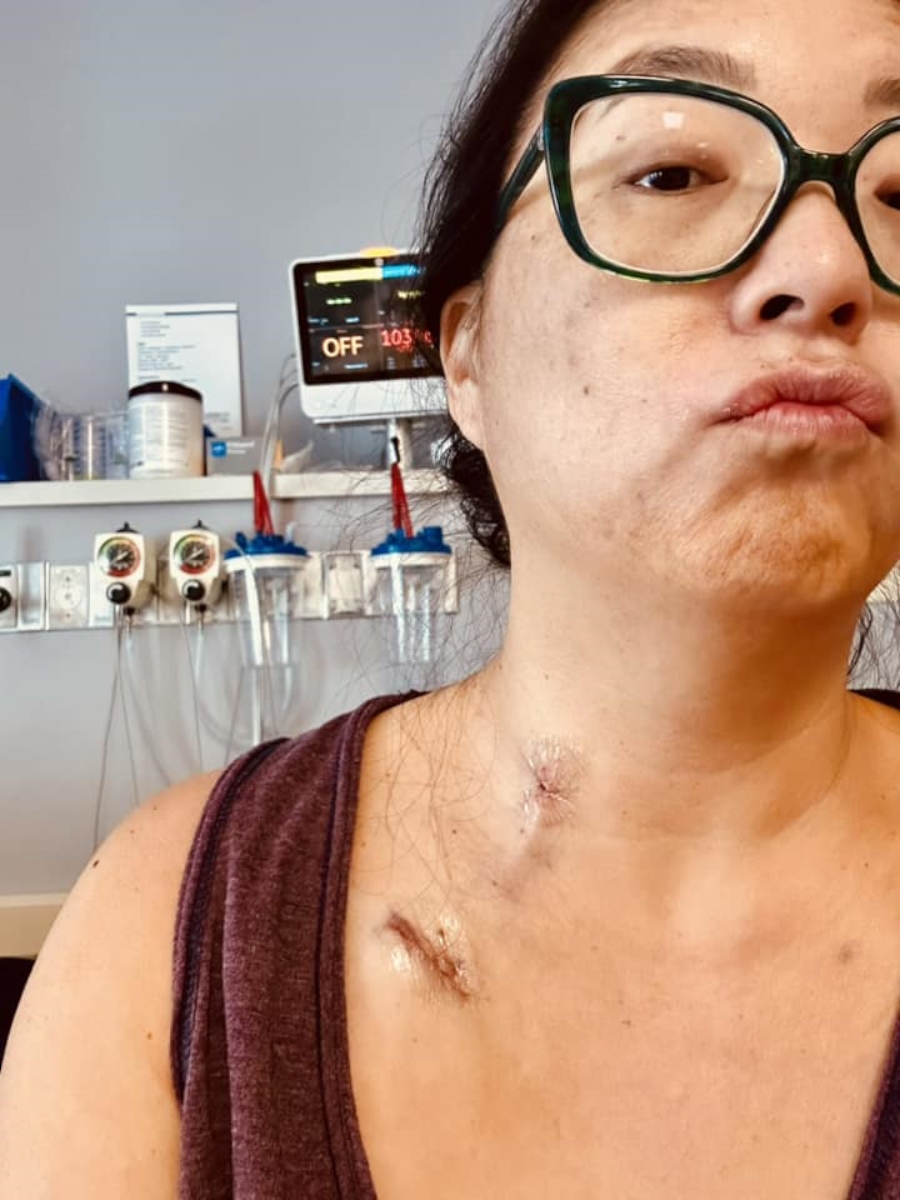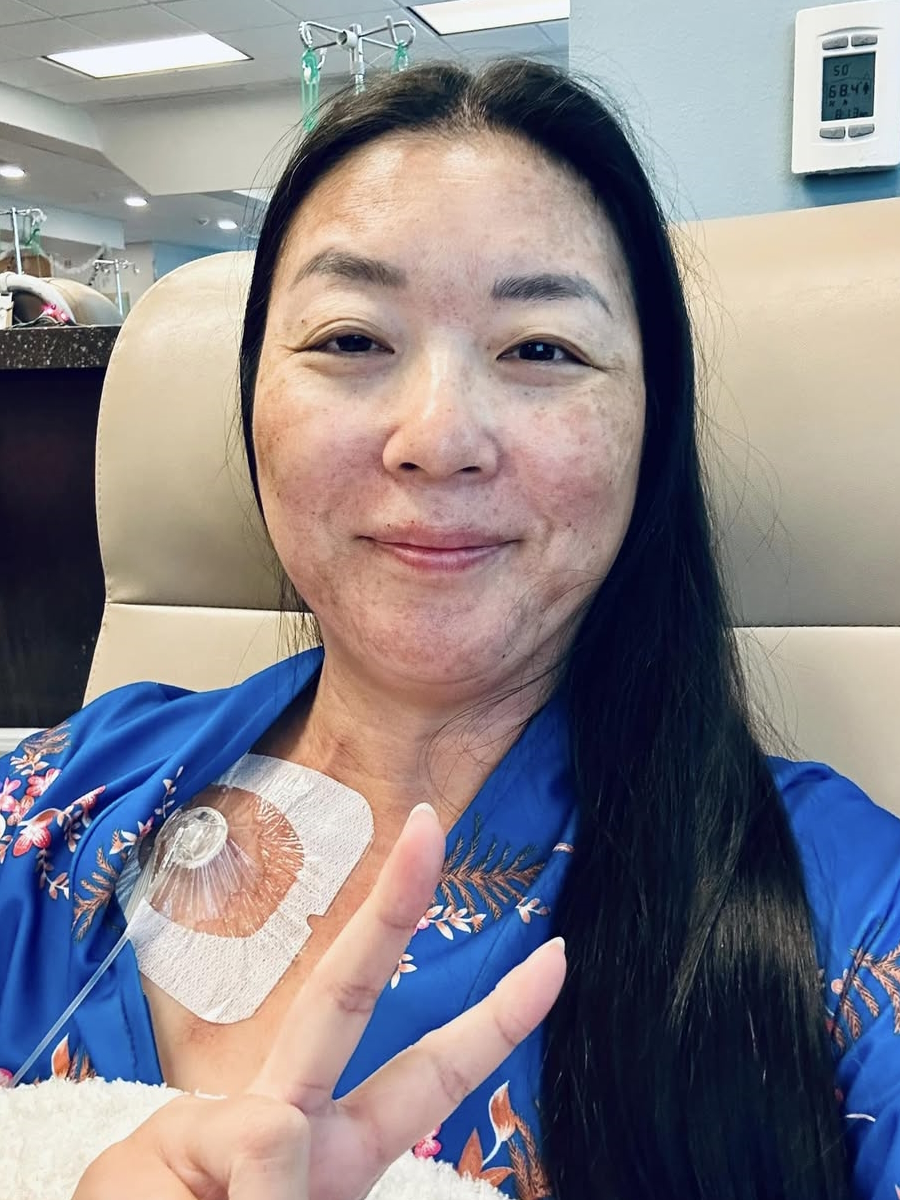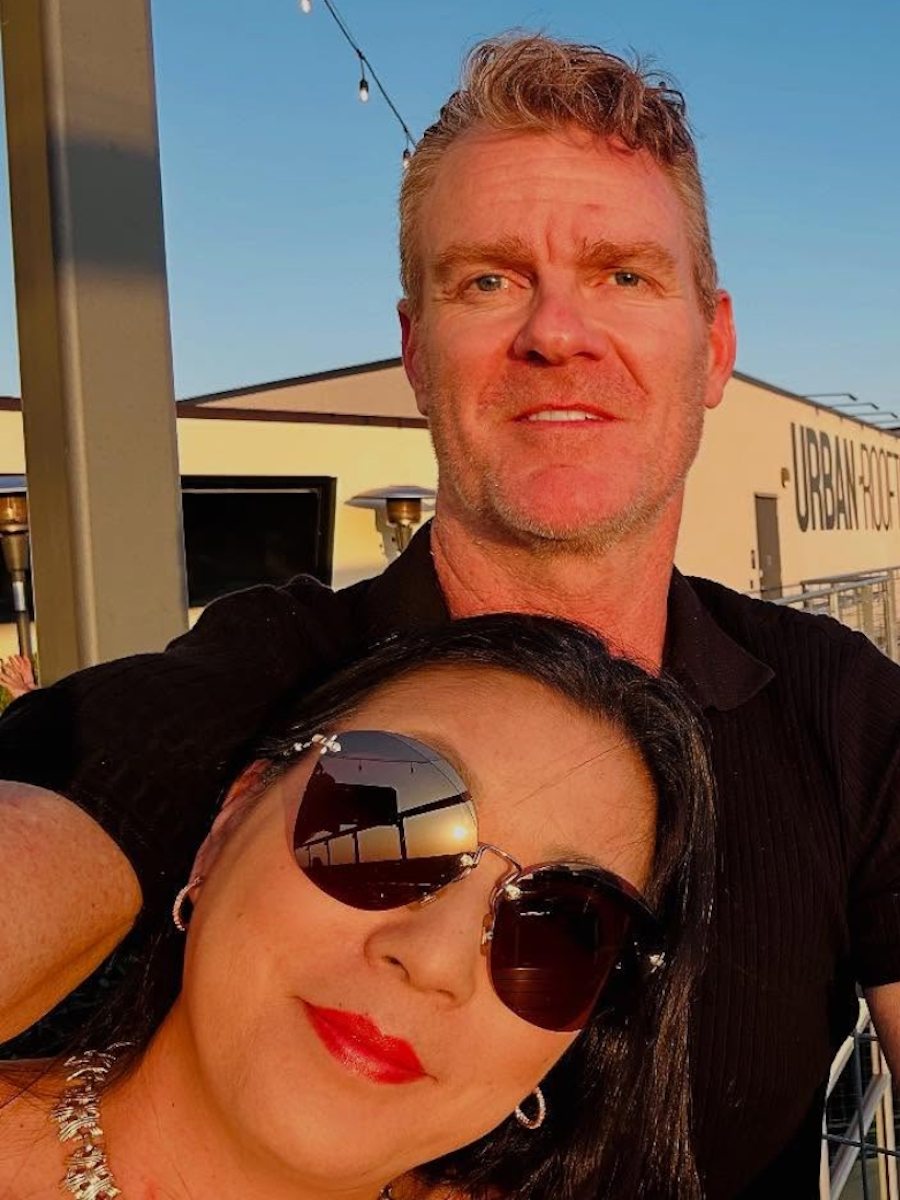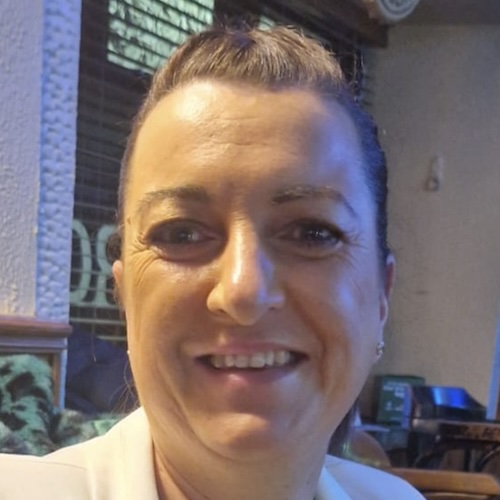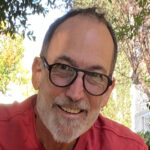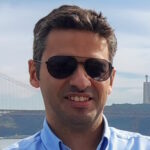Emily Breaks Stigmas and Builds Awareness Around Stage 4 EGFR+ Lung Cancer
Emily never imagined that a lingering cough would lead to a diagnosis of stage 4 EGFR+ lung cancer in September 2024. As someone who is active and outdoorsy, she initially chalked her symptoms up to Austin’s notorious allergy season. But when she struggled to breathe during a familiar hike and noticed her voice changing, she knew something was off. Even then, cancer wasn’t on her radar until scans confirmed the diagnosis.
Interviewed by: Nikki Murphy
Edited by: Katrina Villareal
At first, Emily felt overwhelmed, thinking her life expectancy had suddenly been cut short. However, her oncologist reassured her that while stage 4 EGFR+ lung cancer is incurable, it’s treatable and treatments have come a long way. That perspective helped her move from despair to action. Emily chose both chemotherapy and targeted therapy, later adding radiation, and now she’s stable with minimal side effects. She enjoys being active again and even swims with her neighborhood team.
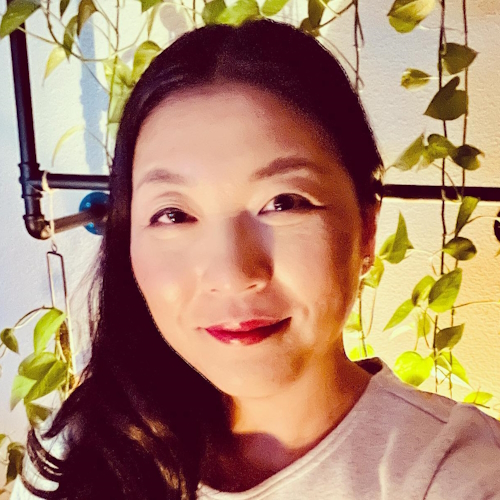
Throughout her experience, Emily has leaned heavily on her friends, family, and wider community. From organizing rides to appointments to surprising her with a fully cleaned and organized house, her circle showed up in ways she never expected. She emphasizes that asking for help is not a weakness; it’s a gift that allows others to love and support you.
Emily also became vocal about advocacy, especially within the Asian community, where awareness about stage 4 EGFR+ lung cancer is still limited. She shares her story and reminds others not to dismiss persistent coughs or shortness of breath. She hopes that by speaking up, more people will push for answers earlier and potentially catch cancer sooner.
Another pillar of her healing has been focusing on mental health. Emily admits that when treatment began, she was too overwhelmed to join support groups, but therapy later helped her process the uncertainty of living with advanced cancer. Practicing mindfulness and giving herself grace has been essential. She’s learning to appreciate everyday moments, like petting her dogs, spending time with her kids, and cherishing the present, without constantly worrying about the future.
Stage 4 EGFR+ lung cancer does not mean life is over. With evolving treatments and community support, it’s possible to live fully and meaningfully. Emily’s story reminds us that resilience often looks like honesty, vulnerability, and the courage to ask for help.
Hear directly from Emily in her video or keep scrolling to read the full interview:
- How a “simple cough” turned into a diagnosis of stage 4 EGFR+ lung cancer
- The powerful ways Emily’s friends and family rallied around her
- Why Emily is raising awareness about lung cancer, specifically within the Asian community
- How therapy, mindfulness, and giving herself grace helped Emily find peace
- The hopeful perspective her oncologist shared that changed everything
- Name: Emily N.
- Age of Diagnosis:
- 46
- Diagnosis:
- Non-Small Cell Lung Cancer (NSCLC)
- Staging:
- Stage 4
- Mutation:
- EGFR
- Symptoms:
- Chronic cough
- Persistent post-nasal drip
- Shortness of breath while doing simple activities
- Changes in voice
- Rib pain
- Treatments:
- Chemotherapy
- Targeted therapy: tyrosine kinase inhibitor (TKI)
- Radiation therapy
This interview has been edited for clarity and length. This is not medical advice. Please consult with your healthcare provider to make informed treatment decisions.
The views and opinions expressed in this interview do not necessarily reflect those of The Patient Story.
- Hi, I’m Emily
- When I first felt something was wrong
- The moment everything changed
- The cancer spread
- How I educated myself about my diagnosis
- I was given options for treatment
- What life is like on targeted therapy
- How I feel about being on treatment indefinitely
- My life will never be the same again
- I’m so grateful for my support system
- What I want others to know
Hi, I’m Emily
I live in Austin, Texas, and I was diagnosed with stage 4 lung cancer with an EGFR mutation in September 2024.
I would say that I’m an ambivert, a little bit quirky, and pretty dorky. I love nature and animals. I try to love my plants, but they don’t always love me back. I love to read, swim, and trail run. I have a very large support network that I have been very blessed with.
When I first felt something was wrong
In the fall of 2023, I started developing a cough, which I didn’t think much of. I live in Austin. The allergies are insane. They’re tough, so I didn’t think much of it.
When the cough persisted into early 2024 again, I didn’t think much of it because now we’re into cedar season. There was always something on top of it. I’m pretty active and healthy, so I never considered that anything was wrong.
Around May 2024, I went to a doctor because I could feel that I had a persistent post-nasal drip, which he confirmed. I mentioned a cough, but he didn’t seem too concerned about it. He prescribed some nasal sprays and sent me on my way.
It was on August 31st when I realized that something was wrong. I went for a hike with my partner and it was hot. But as we were finishing the hike, which had a decent uphill grade, I couldn’t breathe. I was doubled over and couldn’t catch my breath. This is a hike I’ve done many times, so I was a little bit surprised, as was he. I chalked it up to the heat.
But by then, my voice had already started to change. I had no projection in my voice. It was scratchy. Sometimes it would get high-pitched; other times, it would get a little deeper. I didn’t think much of it because I thought it was because I was coughing a lot.
But when I realized I was having some difficulty breathing on a hike that I did all the time, it became my first red flag. Then I started noticing little things like getting winded going up stairs or doing a trail run and having trouble breathing. That’s when I freaked out and realized I needed to see a doctor about this.
The moment everything changed
When I went to a new primary care provider (PCP), I thought she was going to say I have asthma or bronchitis. Never in the realm of possibility did I think I was going to have lung cancer. But she took everything very seriously. She sent me to get a chest X-ray, referred me to an ENT, and ordered blood tests.
I got a chest X-ray that same week and then she called me on the day I was supposed to go with my best friends on a girls’ trip to celebrate a birthday. She said that there were concerns with my chest X-ray. There were nodules and she wanted me to get a CT scan when I returned. She mentioned the possibility of cancer, but she said it also could be nothing. So when my best friend walked in the door to pick me up to go to the airport, the first words out of my mouth were, “I might have cancer,” and we started freaking out. This is a great start to a girls’ trip.
When I got back, I got my CT scan done on a Friday and the physician assistant (PA) called me that Sunday, and it’s never good news when your PA calls on a weekend. I was out and almost didn’t pick up the call because I didn’t know who it was, but I’m glad I did.
She introduced herself and I asked, “Do I need to sit down?” She said yes. She explained that the nodules were cancerous. I had a bajillion questions and rightfully, she said, “I’m not an oncologist. I can’t talk about staging.” She did give me her personal cell phone number for support and then said, “I’m referring you out to Texas Oncology.”
At that time, I hadn’t told anybody other than my two best friends with whom I went on the girls’ trip. I called my sister on my way home, went straight to another best friend’s house, and banged on her door and said, “Let me in. I need you.” We held each other and sobbed. That was a rough day.
The cancer spread
That same best friend took me to my appointment and my oncologist explained that this was stage 4. It metastasized to other parts of my body. I found out later exactly where it all went. There were quite a few places.
One thing she indicated was that I had a spot on my eighth rib bone on my right side, which explained why, over the summer, I apparently had fractured it and had no idea. I thought it was an intercostal rib strain. I would have no reason to think I would have fractured a rib, but she explained why I was in so much pain there.
I went into the appointment saying, “How can I have lung cancer? I’m a nonsmoker. I’m 45 years old. I’m active. I’m healthy.” She explained that I perfectly fit the demographic of EGFR lung cancer. At that point, it was the end of September. I still hadn’t had any biopsies, so she had me admitted to the hospital. I was there for about five days for a bunch of tests. They did a lung biopsy, checked out my pancreas, and did another MRI. That week was a blur.
My oncologist is very well regarded within the community here. Every time I mention her name, other patients would say she’s the best. Other medical professionals I went to also say she’s the best. At one point, she explained that she was considering working at MD Anderson and decided not to. My other thought was to go to MD Anderson, but that would have been logistically very difficult. I completely trusted her judgment and my case seemed like an open-and-shut case.
How I educated myself about my diagnosis
I knew absolutely nothing because in my head, lung cancer was for smokers. When she mentioned that, of course, I started Googling everything I could about EGFR. It came down to the question: Why me? What could I have done differently? It just came down to bad luck. Had I known that a chronic cough was a symptom, I would have gone to the doctor immediately. That’s when I started speaking about this type of lung cancer because I got a sense that it wasn’t well-known, especially in the Asian community.
At the time, I didn’t join any support groups. I thought it would be too overwhelming because initially, it was all too much. A lot of the information, especially before my first appointment with my oncologist, was very grim. There was a two-week period when I had no idea what to do. I just knew I had stage 4 cancer.
At the time, my boys were 12 and 14. I wanted to be as open and honest with my kids as possible. I didn’t want to hide anything from them, so I was very real and honest. I said, “This is scary. I don’t know what’s going to happen. The worst thing that could happen is something bad happening to you guys. The second worst thing is me leaving you too soon.”
I was worried that I wouldn’t see my youngest son graduate from high school. They’re still babies. They’re not full-fledged adults. I wasn’t ready to leave them. I needed to process all the fears and worries by myself. I thought that if I joined a support group, I would spiral deeper.
For my kids, we had them go to Wonders & Worries in Austin. They went through a six-week program, which I think was helpful for them. Once I got through my hospital stay, process, and understood that this wasn’t necessarily a death sentence and it was treatable, my mindset changed. I didn’t need therapy at that time because I needed to survive. I needed to process everything. I’m in therapy now, but at that time, I was in my head too much to even talk about it over and over again.
It was absolutely sobering. My immediate reaction was I’m screwed. I’m dead in a few years. Of course, this was before my oncologist said anything. I thought, “This is it for me.” It’s probably the scariest news someone can get about their health, especially having no idea that you were sick to begin with.
The primary was my left lung. I had innumerable small nodules in my right lung. It had also spread to the rib, sacrum, and pancreas, and I also had a tiny spot on my brain.
I was given options for treatment
She mentioned targeted therapy and a particular drug that worked very well with this type of cancer. However, it’s a little bit slow-acting. She mentioned that if I wanted to be more aggressive, I could do chemotherapy. We discussed the pros and cons of both treatment options. I want to fight this as hard as I can, so I decided to take the aggressive approach and start chemotherapy, which was in November. She agreed with it. She let me drive that discussion and the decision. Afterward, she said, “That’s what I would have chosen for you as well.”
I started the targeted therapy drug and chemotherapy on the same day. I had four rounds of chemo between November 2024 and January 2025. After my PET scan in January, I received good news — she told me I wouldn’t need chemo anymore.
I went back to work and that same week, I received word that after discussing with a radiation oncologist, the two of them decided that it would be beneficial for me to also do a couple of rounds of radiation.
What life is like on targeted therapy
This particular drug that I’m on, I need to take at the same time every day. I take it between 10:00 and 10:30 every morning. I have been very lucky that I haven’t had a lot of side effects with the drug itself. I definitely felt them with chemo. The drug itself has been fine. I don’t feel much of a difference. I feel great right now. I wake up, hang out, take my drug, and go about my day. No major side effects.
The big side effect I had was joint pain. I felt it mostly in my fingers and knees, and occasionally on my hips. It varied from time to time, but mostly my knees and my fingers, which I also wondered about. Coupled with perimenopause, it was a double whammy. I talked to my oncologist about it and she recommended that I go on a supplement. Ever since then, I’ve felt great.
How I feel about being on treatment indefinitely
My oncologist said she would be open to clinical trials for me. It would just have to be the right one. We haven’t discussed it since then, which tells me she has not seen the right one come through. She would want something that has gone through a round or two before getting me in because she does not want me to be one of the first-round folks, which I appreciate.
Part of why I’m in therapy now is that the closer I got to feeling better, the more anxious I became. I’m stage 4 and I know that I’m on this drug until it stops working. Being stage 4, I expect it to come back. I’m in a very good place right now. I’m as healthy as I can be. But it will come back. It’s just a matter of time. Waiting for the other shoe to drop brought me so much anxiety.
I feel great right now. How long am I going to feel great before it creeps up again or before the drug stops working? Is it five years? Two years? 20 years? Having that loom over my head is what was so unnerving. I keep practicing mindfulness in that regard. I talk to my therapist about it and try to stay in the moment. I also tell myself every single day that tomorrow is not guaranteed for anybody, regardless of how healthy they are.
My life will never be the same again
My fitness level completely decreased, especially while going through chemotherapy and radiation. Fall is a great time in Austin to be outside, hiking, and enjoying the weather, and I couldn’t do any of that. I couldn’t trail run anymore. I was told not to hike. I was told to walk around my neighborhood, but walking on sidewalks is not as fun as walking on dirt for me, so that took a hit in terms of my physical and mental well-being.
Once the weather started getting warmer, I also found that I couldn’t be back in the pool immediately. Any sort of exercise was basically gone, other than a nice, leisurely walk, which, for someone who is a pseudo-athlete, is very difficult. Constantly going places, whether it’s the grocery store, felt like the COVID pandemic again, where I had to make sure that I did not get any illness whatsoever from anybody. Even my friends would say, “I’m not feeling well. I need to cancel plans with you.” It’s fine and I thank them, but not having the lung capacity to do basic happy things was tough.
I went through life imagining this beautiful future, growing old with my partner, and becoming a grandma, hopefully. I had to come to grips with the idea that I could get in a car crash the next day, but what I had planned for my future may not happen. I have come to accept that if I get to be 65 years old, I will be lucky. I will be lucky if I live long enough to become a grandmother because that’s all I want right now. I want to get promoted to grandma.
Before, it felt automatic that I’d be here until my kids grow old and then I’m going to help take care of their kids. I get to love my future grandchildren. I realize that may not happen for me, so I appreciate what I have now, as cheesy as it sounds, and enjoy the moment. I appreciate every single day for what it is.
I have been through other hardships recently, but being able to travel and see old friends is a blessing, even if the reason isn’t great. Being able to pet my dogs and waking up in bed are simple things that I’m still able to do. On the flip side, life is too short to put up with a bunch of crap. It’s also important to know when to say you’re not going to deal with certain things or not live in that space and let things go.
I was able to go back to work for a few months. I was laid off recently, so that’s one of the hardships I mentioned. But being on the drug has improved my life so much. I’m back in the pool. We even have a neighborhood swim team and that’s been fun. I look forward to our weekly swim practices and hanging out with the team.
When it’s not a thousand degrees here, I will go back to the trails and do some trail running. I have a sense of normalcy now and it feels different than taking the drug every day. My life feels like it was before I got diagnosed.
Those who were closest to me, my inner circles, were aware. After diagnosis, I told my immediate family, my best friends, and two other close friends, and that was it. Then it became a need-to-know basis. If I went to a party and someone asked why I was losing my voice, if it was someone I knew well enough, I would tell them.
My story slowly came out, but I didn’t go public with it until around March. I realized that I fit the demographic. Had I known that my cough was an indicator of cancer, I would have gone to the doctor immediately and said, “Tell me about lung cancer. I think I’m at risk of this. Please run all the tests.” I would have advocated for myself.
I figured there are plenty of other people like me, so that’s when I started talking about it at work. I posted about it to our Asian network and our women’s network. I posted about it on our neighborhood Facebook page. It was not just the Asian community specifically. My non-Asian friends might know somebody. I’m trying to get the word out there that this was a surprise.
The more I looked into it, the more I realized there are so many people like me who get diagnosed at a late stage because they had no idea. I slowly started putting myself out there. I joined that Facebook group to hopefully have that support system. Now, I feel better, but I’m also reaching out to as many places as possible. Over the course of a few months, I had 4 or 5 people say they had a cough or knew someone who had a cough, and someone else was diagnosed. If you have a cough, go and make that appointment.
I’m so grateful for my support system
If there’s one thing my friends know about me, it’s that I’m not shy about asking for help. My best friend Jenny created a Facebook group for me so we could keep friends and family updated in terms of my appointments, test results, etc. “I’ve got an appointment on this day. Who can take me?” “I’m coming back from chemo. Who wants to bring me food?” I’ve had no shortage of help in that regard. It was one of the greatest gifts I had during that time.
Before I started treatment, my sister took me on a vacation because I needed it. But while I was gone, one of my best friends got an army together to help clean my house. I had previously told her, “Oh, man. My parents are coming in with a one-way ticket. The one thing I’m not looking forward to is cleaning the guest room, organizing it, and organizing the garage.” I, like many people, use the guest room as a storage space. She jumped on it and said, “Oh, absolutely, I will do that for you.”
She did it while I was gone and not only that, she enlisted the help of so many other friends and they did the entire house. When I came back, I thought she was only doing the two spaces. A big group of friends, my partner, my ex-husband, and the kids all contributed to this huge gift, which she still claims is not that big of a deal. It’s a big deal to me.
What I want others to know
My oncologist told me at my first appointment that stage 4, especially with EGFR-positive lung cancer, is not an absolute death sentence. She told me repeatedly that it is incurable, but it is treatable. I do feel like I’m living proof of that. I did not expect to be in such a good place in such a short time. I thought I would still be struggling with this diagnosis, even with my treatments. I was diagnosed in September and here we are, less than a year later, and I’m basically in remission.
It’s a tough pill to swallow, but there’s hope. I was also told repeatedly that lung cancer research is always evolving. It’s a great time right now. We just need to make it to the next breakthrough. Even the drug that I’m on now didn’t exist years ago. Keep making it to the next one.
As cheesy as it sounds, try to stay positive because that mindset is everything. Could we lie in bed and cry, and feel sorry for ourselves? Absolutely. But that doesn’t help the body or the mind. Try to stay positive, enjoy the life we have now, and know that there’s still hope for a life post-diagnosis.
My life expectancy is much shorter. I thought I was only in my midlife at this point. I’m turning 47 soon. I envisioned life until I was 80-something. It undoubtedly will be cut short, but that’s okay because when I think about perspective, hopefully I can see my kids into adulthood, which not everybody can. I can enjoy the life that I have now as much as possible.
Asking for help is not a weakness. People want to do things on their own. They think they can manage or don’t want to bother family and friends. They don’t want to bother people by asking for help. What I’ve learned is your people, your tribe, want to help you. They want to be there for you in times of crisis. Why else would they be your friends? Don’t be afraid to ask for help and support.

Inspired by Emily's story?
Share your story, too!
More EGFR+ Lung Cancer Stories
Samantha V., Lung Cancer, EGFR+, Stage 2, Grade 3
Symptoms: Breathlessness, hoarseness, sinus infections, fatigue, pain in left side
Treatments: Clinical trial (targeted therapy)
Natasha L., Lung Cancer, EGFR+, Stage 4
Symptoms: Hoarse voice, squeaky breathing, cough, weight loss, fatigue
Treatment: Targeted therapy
Jeff S., Non-Small Cell Lung Cancer with EGFR exon 19 Deletion, Stage 4 (Metastatic)
Symptom: Slight cough
Treatments: Surgery, radiation, chemotherapy, targeted therapy
Jill F., Non-Small Cell Lung Cancer with EGFR Exon 19 Deletion, Stage 1A
Symptom: Nodule found during periodic scan
Treatments: Surgery, targeted therapy, radiation
Filipe P., Non-Small Cell Lung Cancer with EGFR Exon 19 Deletion, Stage 4 (Metastatic)
Symptom: Headache
Treatments: Surgery (to remove brain metastasis), cryoablation (to remove kidney metastasis), targeted therapy, SBRT, bispecific antibody
